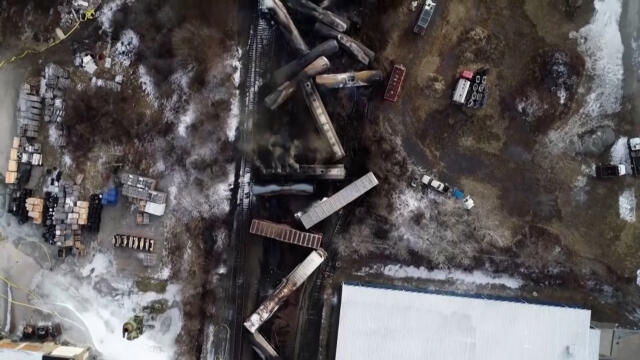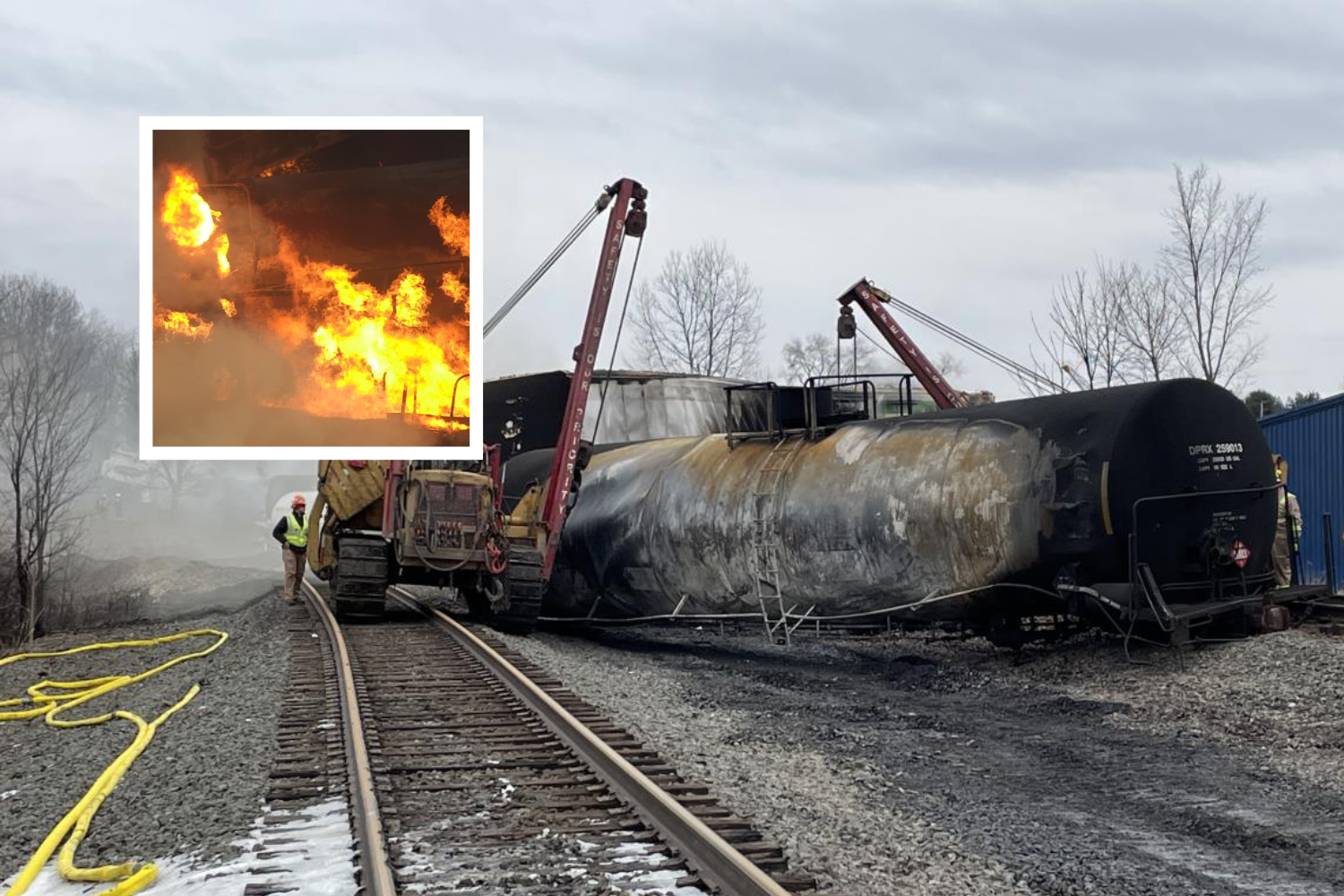Months-Long Lingering Of Toxic Chemicals After Ohio Train Derailment

Table of Contents
The Initial Impact and Immediate Concerns
On February 3, 2023, a Norfolk Southern freight train derailed in East Palestine, Ohio, causing a catastrophic release of hazardous materials. Vinyl chloride, butyl acrylate, and other toxic chemicals spilled, creating an immediate public health emergency. The resulting fire and controlled burn of vinyl chloride further exacerbated the situation, releasing potentially harmful byproducts into the air.
Residents reported experiencing a range of symptoms, including headaches, nausea, respiratory irritation, and skin rashes. The immediate concerns focused on the acute health effects of exposure to these dangerous chemicals.
- Reported Illnesses: Hundreds of residents reported experiencing various symptoms following the derailment.
- Government Response: Initial government response included evacuation orders for a limited area surrounding the derailment site. However, the extent and duration of the evacuations have been a subject of ongoing debate.
- Early Contamination Levels: Initial air and water testing revealed elevated levels of contaminants, sparking immediate worries about both short-term and long-term exposure.
Long-Term Environmental Contamination
The months-long lingering of toxic chemicals presents a severe threat to the long-term health of the environment. The persistence of these chemicals in soil, water, and air raises concerns about bioaccumulation – the gradual increase in the concentration of a substance in a living organism over time. This can have devastating impacts on the entire ecosystem.
Several reports and studies highlight the ongoing contamination. The long-term ecological consequences are still largely unknown but potentially catastrophic.
- Soil Testing: Soil samples taken in the area have revealed significant levels of contamination from various chemicals, raising concerns about long-term soil health and potential leaching into groundwater.
- Water Quality: Water quality testing continues to be conducted, but concerns persist about the potential contamination of drinking water sources and the impact on aquatic life.
- Wildlife Impact: The impact on local wildlife populations, including fish, birds, and other animals, remains a major concern. The long-term effects on biodiversity are yet to be fully understood.
- Ecological Consequences: The long-term ecological consequences of this contamination could be profound, potentially impacting the entire food web and the delicate balance of the local ecosystem.
Health Impacts and Ongoing Monitoring
The potential long-term health impacts from exposure to the released chemicals are a primary concern. Vinyl chloride, for example, is a known carcinogen, increasing the risk of various cancers. Butyl acrylate can cause respiratory problems and skin irritation. The prolonged exposure of residents raises serious concerns about a wide range of health issues.
Ongoing health monitoring is crucial, but its limitations are significant. Accurately assessing long-term health impacts requires extensive, long-term epidemiological studies.
- Linked Health Problems: Potential long-term health issues include various cancers, respiratory illnesses, neurological problems, and reproductive issues.
- Assessment Challenges: Challenges in assessing long-term health impacts include difficulties in isolating exposure levels, establishing a control group, and accounting for pre-existing health conditions.
- Government Role: Government agencies play a critical role in health monitoring, but questions remain about the adequacy of their response and the transparency of their findings.
- Community Advocacy: Community advocacy groups are working tirelessly to ensure adequate health monitoring and support for affected residents.
Government Response and Accountability
The government's response to the derailment and its handling of the months-long lingering of toxic chemicals has faced significant criticism. The initial response was deemed inadequate by many, and questions remain about the transparency of information and the effectiveness of the cleanup efforts. Ongoing investigations and legal actions are crucial to determine accountability for the incident.
- Criticism of Response: The slow initial response, the controlled burn of vinyl chloride, and the communication with residents have all drawn criticism.
- Ongoing Investigations: Several investigations are underway to determine the causes of the derailment and assess the extent of the environmental and health consequences.
- Legislative Changes: Proposed legislative changes aim to strengthen regulations surrounding the transportation of hazardous materials.
- Accountability: Holding those responsible accountable for the derailment and its consequences is crucial to prevent similar disasters in the future.
Community Concerns and Activism
The East Palestine community has shown remarkable resilience in the face of this crisis. Residents are demanding transparency, accountability, and long-term support. Community activism has played a crucial role in bringing attention to the ongoing issues and pushing for greater government action.
- Community Protests: Residents have organized numerous protests and demonstrations to voice their concerns and demand action from authorities.
- Citizen Monitoring: Citizen initiatives are undertaking independent environmental monitoring to supplement official efforts.
- Community Health Advocacy: Local groups are providing support and advocacy for residents facing health challenges.
Conclusion: Addressing the Months-Long Lingering of Toxic Chemicals
The Ohio train derailment has exposed the devastating and long-lasting consequences of hazardous material spills. The months-long lingering of toxic chemicals continues to pose a significant threat to public health and the environment. Continued monitoring, thorough investigations, and strong government accountability are essential to address the immediate and long-term impacts of this disaster. We must learn from this tragedy and implement stricter regulations to prevent future incidents.
To stay informed about the ongoing situation and support affected communities, visit [link to relevant organization 1] and [link to relevant organization 2]. Demand stricter regulations and accountability for the transportation of hazardous materials. Let's work together to prevent the months-long lingering of toxic chemicals from becoming the legacy of this devastating event.

Featured Posts
-
 Ohio Train Derailment Toxic Chemical Lingering In Buildings
Apr 22, 2025
Ohio Train Derailment Toxic Chemical Lingering In Buildings
Apr 22, 2025 -
 Hollywood At A Standstill The Combined Impact Of The Writers And Actors Strikes
Apr 22, 2025
Hollywood At A Standstill The Combined Impact Of The Writers And Actors Strikes
Apr 22, 2025 -
 Hegseth Signal Chat Leaks Detailed Military Strategies Disclosed
Apr 22, 2025
Hegseth Signal Chat Leaks Detailed Military Strategies Disclosed
Apr 22, 2025 -
 Aramco And Byd Join Forces Exploring The Future Of Electric Vehicles
Apr 22, 2025
Aramco And Byd Join Forces Exploring The Future Of Electric Vehicles
Apr 22, 2025 -
 Razer Blade 16 2025 Ultra Thin Gaming Laptop Performance And Price Analysis
Apr 22, 2025
Razer Blade 16 2025 Ultra Thin Gaming Laptop Performance And Price Analysis
Apr 22, 2025
